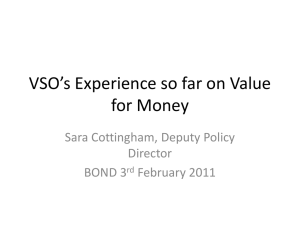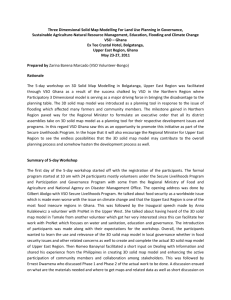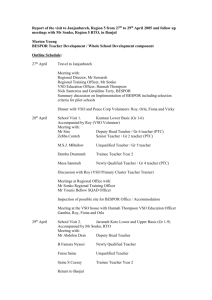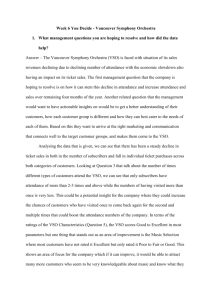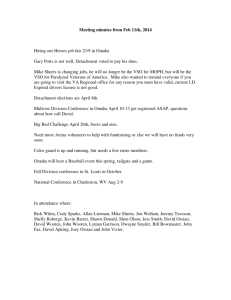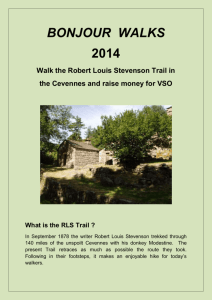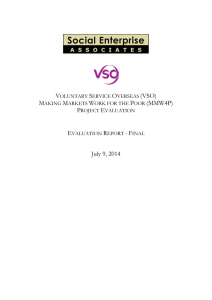Mature Volunteers to International NGOs Industry
advertisement
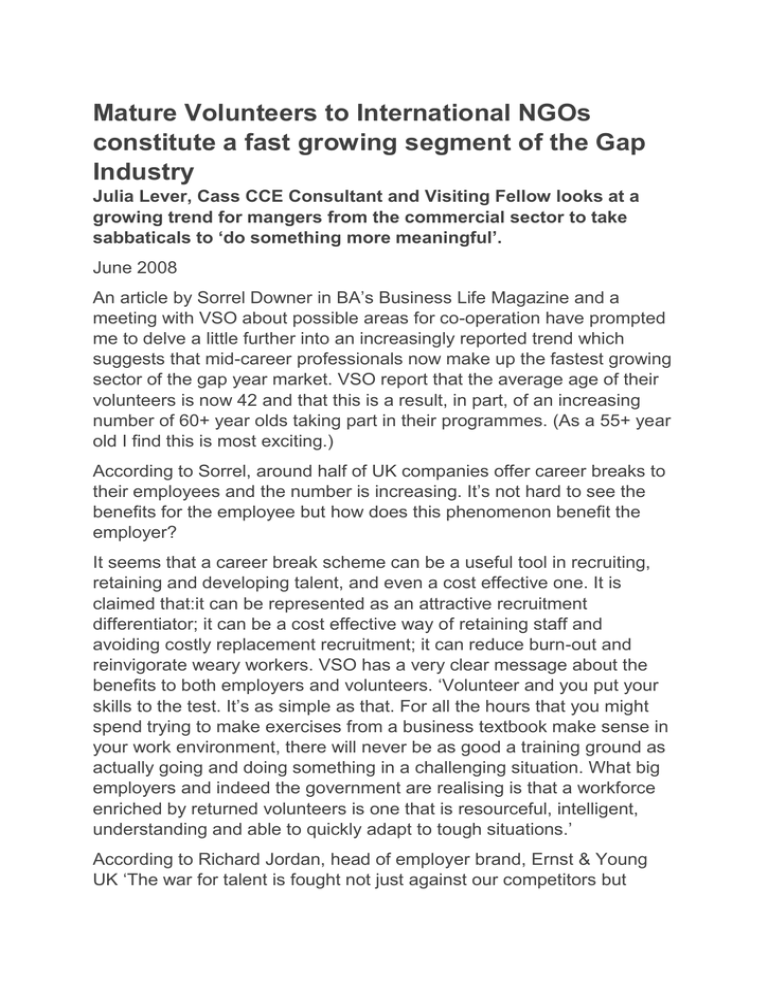
Mature Volunteers to International NGOs constitute a fast growing segment of the Gap Industry Julia Lever, Cass CCE Consultant and Visiting Fellow looks at a growing trend for mangers from the commercial sector to take sabbaticals to ‘do something more meaningful’. June 2008 An article by Sorrel Downer in BA’s Business Life Magazine and a meeting with VSO about possible areas for co-operation have prompted me to delve a little further into an increasingly reported trend which suggests that mid-career professionals now make up the fastest growing sector of the gap year market. VSO report that the average age of their volunteers is now 42 and that this is a result, in part, of an increasing number of 60+ year olds taking part in their programmes. (As a 55+ year old I find this is most exciting.) According to Sorrel, around half of UK companies offer career breaks to their employees and the number is increasing. It’s not hard to see the benefits for the employee but how does this phenomenon benefit the employer? It seems that a career break scheme can be a useful tool in recruiting, retaining and developing talent, and even a cost effective one. It is claimed that:it can be represented as an attractive recruitment differentiator; it can be a cost effective way of retaining staff and avoiding costly replacement recruitment; it can reduce burn-out and reinvigorate weary workers. VSO has a very clear message about the benefits to both employers and volunteers. ‘Volunteer and you put your skills to the test. It’s as simple as that. For all the hours that you might spend trying to make exercises from a business textbook make sense in your work environment, there will never be as good a training ground as actually going and doing something in a challenging situation. What big employers and indeed the government are realising is that a workforce enriched by returned volunteers is one that is resourceful, intelligent, understanding and able to quickly adapt to tough situations.’ According to Richard Jordan, head of employer brand, Ernst & Young UK ‘The war for talent is fought not just against our competitors but against anything else someone could do with their life.’ Presumably then talent within domestic Third Sector organisations is similarly attracted to such opportunities and indeed this was borne out for me by attendees at a recent VSO Volunteering evening at which some of those attending were clearly already employed within the sector and clearly giving serious consideration to two- year volunteering assignments around the globe. Obviously not every employer is as supportive as some of the bigger firms who can afford to have a progressive approach to staff retention. Smaller firms in particular will struggle perhaps to ‘compete’ in this way as will Third Sector organisations. An increasing number of those at the top are also taking time out. At one of our recent Charity Talks we heard from Richard Harvey, former global CEO with Aviva who left behind heading an organisation with 40 million customers and £364bn of managed assets to join Concern Universal for a year, together with his wife Kay, to work on a water and sanitation programme in Malawi. Sorrel records that Colin Holmes, CEO of Tesco’s convenience store division took a break to ‘do voluntary work and spend time with his family, after working for the company for 20 years, and has just returned to work’. These trends, if that is what they are, must surely be viewed as encouraging given the value they suggest of being involved in ‘civil society as well as to the participating individual and their employers, if they return. According to a Norwich Union survey about 20% don’t which is estimated to cost industry around £7.9bn. It would be interesting to know where this non-returning 20% go; perhaps if they make the move into paid employment within our sector they should be encouraged to invest in the specialist business education for the nonprofit sector provided by Cass CCE (go to www.cass.city.ac.uk/cce). What I have found most striking has been the number of people engaged in these international volunteering assignments, even in the most undeveloped of locations Tribal Business School highlights what we can learn from traditional societies and VSO actively encourages all its placements to spend a good bit of time at the start of their assignments ‘just listening’. And frankly when we see how well the ‘f‘irst world” is managing its economic affairs we obviously have a lot to learn. The VSO networking evening which I attended recently was entitled ‘Management with a Pulse – changing the world while the world changes you’ - what a brilliant strap line, wish I’d thought of it. I’m just off to pack. Although may be not just yet as in our next issue, in September, we will be running a series of articles on managing volunteers, so I’ll wait a while longer for my ‘gap’ break. Anyone interested to learn more about the employer and the volunteer benefits from participating in VSO programmes should go to the VSO website (http://www.vso.org.uk).
